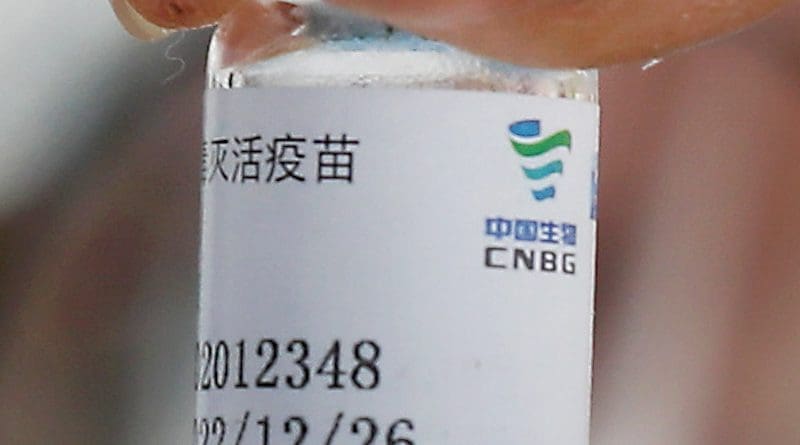China’s ‘Mandatory’ Vaccine: Domestic Political Stabilizer – OpEd
By Dechun Zhang and Dr. James Gomez*
China now is using a “free, but mandatory” vaccination strategy to stabilize the domestic political environment and promote its vaccine overseas.
Although 24 countries have signed deals with the Chinese vaccine companies, the fact that China’s vaccines are less effective than Pfizer and Moderna make those countries suspect to China’s vaccine.
Hence, while the Chinese government hoped the vaccines could help its global reputation, now it is more focused on the domestic market to legitimately promote its vaccines globally.
China started giving emergency vaccinations as early as July 2020. Afterward, China started to conduct mass vaccinations on December 15, 2020. More than 15 million people have taken the vaccines, according to Wang Bin, an official from China’s National Health Commission.
The Chinese government is planning for nine groups of people aged 18 to 59 to receive the vaccine before the Spring Festival of 2021. The Nine groups of people include: worker of cold-chain goods and personnel working in the overseas and domestic transportation sector; work abroad for business and study; staff who work at the border; medical staff; government officers; staff at life-related industry.
Given the goal of approximately vaccinating 50 million people ahead of the 2021 Spring Festival holidays, cities including Beijing, Shanghai, Shenzhen in South China’s Guangdong Province, and other north and eastern China’s provinces have started mass inoculations of vaccines.
“I cannot refuse, if I refuse to take the vaccine, I will lose my job,” a Tianjin police officer who was vaccinated early this month said, “although the agreement claims all participants are voluntarily, we cannot discuss, and they only gave me 48 hours to decide if I would take a vaccine.”
In order to increase public trust in vaccines and encourage more people to get vaccinated, the Chinese government launched a communication campaign on COVID-19 vaccines, such as banners on main roads to encourage more injections in some major Chinese cities.
Although the Chinese public is skeptical with regard to the trustworthiness of China’s vaccine, they are still satisfied with the domestic control policy, such as all Chinese citizens can take for free the vaccine.
“I did not trust China’s vaccine only because it is at the early stage of development,” a Tianjin police officer who was vaccinated early this month said, “I still proud of my country since as a Chinese I can took vaccine for free, and I believe China is the best country in the world to control the COVID-19.”
China ranked the second in the world (4.5 million doses as of December 31, 2020) for doses of COVID-19 vaccine being used in the world, followed by the US (5.92 million). Before January 8, China ranked 15th with the highest percentage of their populations vaccinated against coronavirus in the world, according to data on the Our World in Data, a global data-recording platform developed by Oxford University.
YouGov conducted a survey with about 19,000 people in 17 countries, with the result showing that most of the participants were distrustful of the Covid-19 vaccine made by China.
The Chinese government is also naming students who will study abroad as part of the first priority list.
“I got the information on taking the vaccine for free on one Overseas student WeChat group,” a PhD student at Leiden University who took the vaccine in early November said, “I noticed that students who study overseas can make an appointment online, and then they will be a priority to take vaccines within one month.”
“Although China’s vaccine remains controversial, I felt good and remain confident about our own vaccines especially as they are free of charge,” he said, continuing, “I will introduce my friends and colleagues to China’s vaccine and encourage them to be confident in China’s vaccine.”
Beijing has vaccinated more than 1.9 million people since the mass vaccinations began. Other cities also vaccinate on average 100 to 2,000 people each day.
The Chinese government says that it plans to manufacture at least 1 billion doses of vaccine in 2021, with Sinopharm’s capacity of 120 million doses by 2020. Overall, China’s vaccine could reach 805 million people – around 58 percent of the Chinese population – by the end of 2021.
Although there has been backfire related to China’s vaccine in the global market, China’s domestic vaccine policies seem to elicit the confidence of the nation’s citizens. Chinese citizens pride themselves on living in a country with the ‘best’ and ‘most efficient’ containment measures, no matter what methods the government employs to control COVID-19 pandemic.
As the pandemic is still an on-going issue, the Chinese government will continue to positively frame its vaccine as a solution to pandemic. And, for their part, Chinese citizens will perceive the superiority of the government’s political system, and and happy to live in an “imagined, perfect China.”
Authors:
- Dechun Zhang: PhD candidate, The Leiden University Institute for Area Studies, Faculty of Humanities, Leiden University, Leiden, Netherlands.
- Dr. James Gomez: Regional Director of Asia Center – a not-for-profit organization working to create human rights impact in the region.

